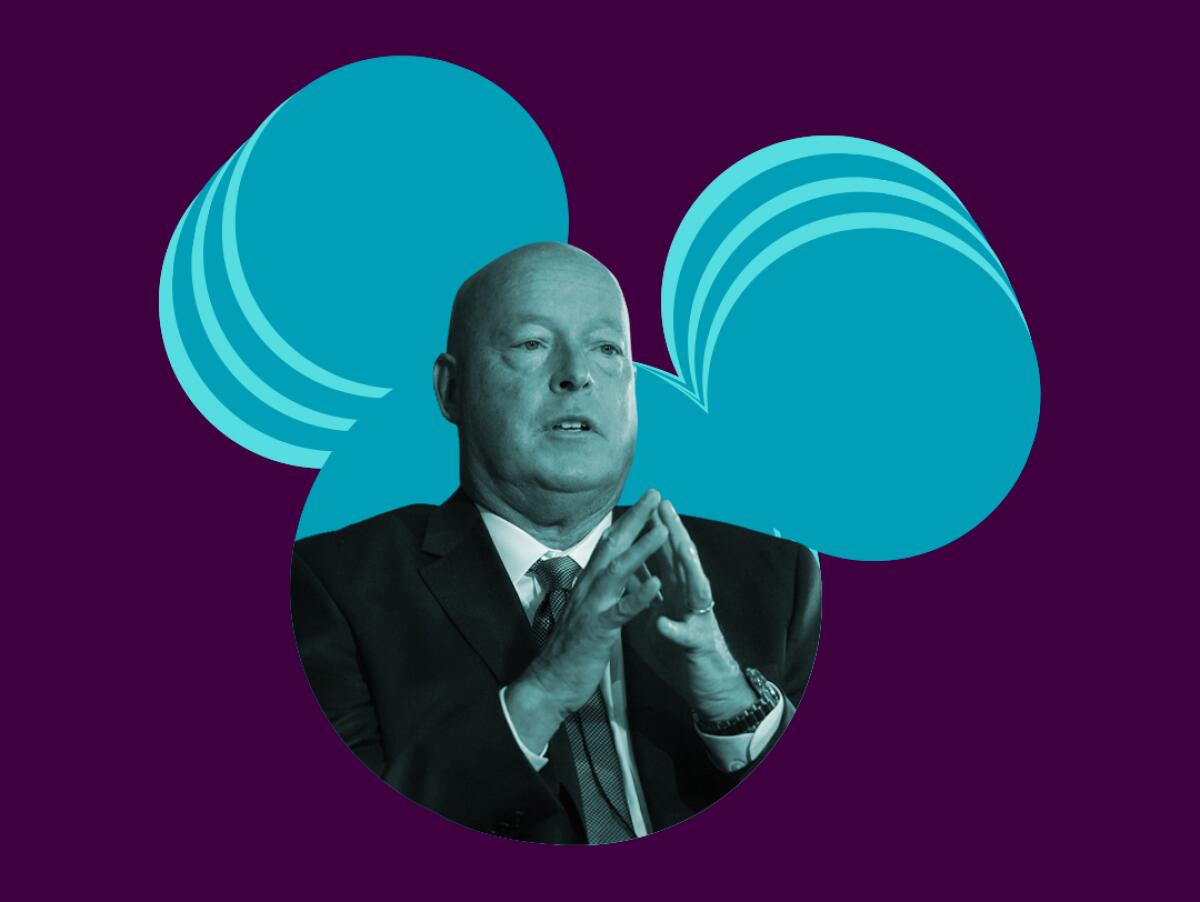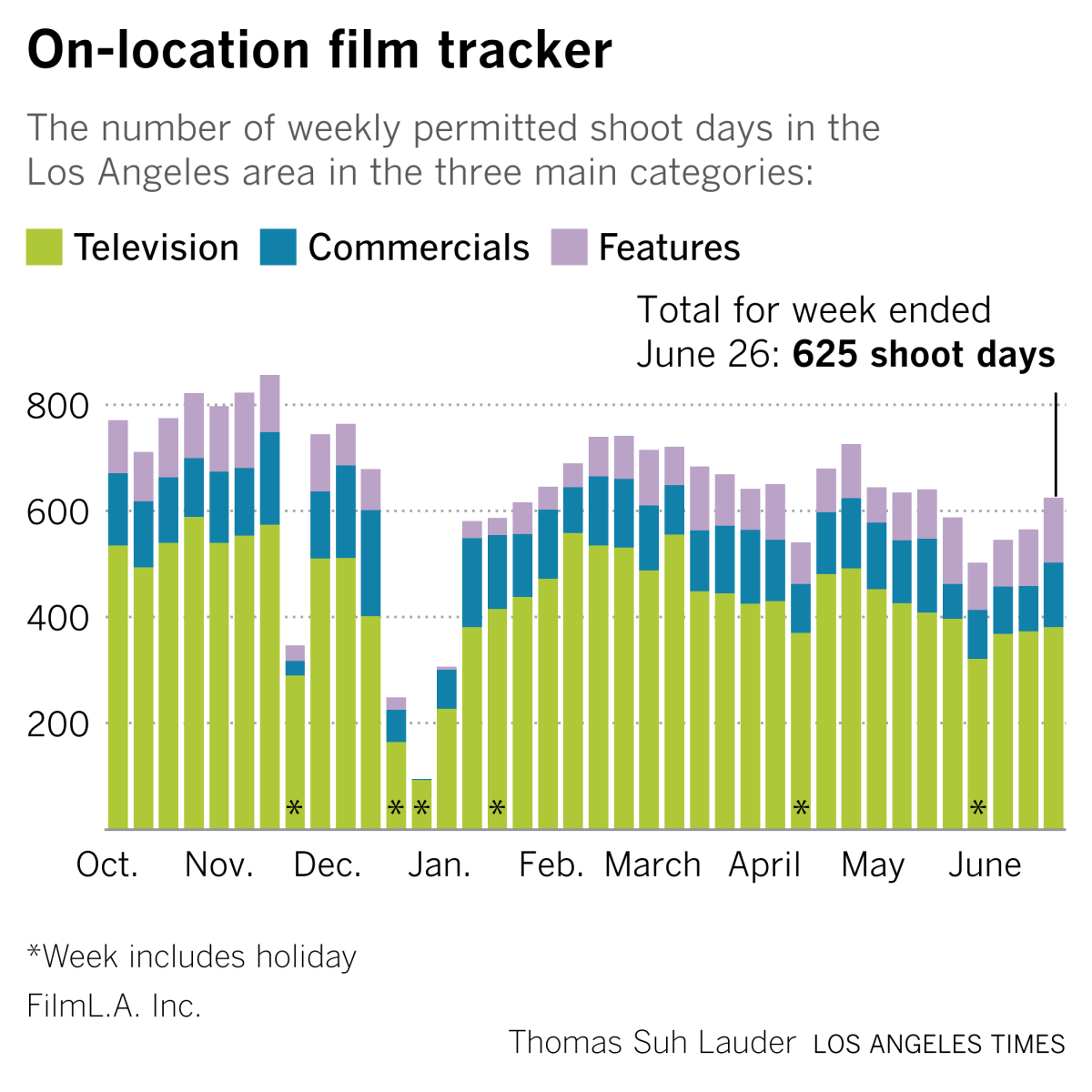Wide Shot: Disney’s drama and Netflix’s 450 cuts

This is the June 28, 2022, edition of the Wide Shot newsletter about the business of entertainment. If this was forwarded to you, sign up here to get it in your inbox.
Hey folks, I’m off this week, so we’re keeping the newsletter relatively short.
An extraordinary amount of drama has befallen Walt Disney Co. this year, and I’m not just talking about the Florida stuff, though make no mistake, that tropical storm has not gone away.
On the occasion of the Burbank entertainment giant’s annual board retreat, I took a step back to analyze Chief Executive Bob Chapek’s tenure six months after Bob Iger officially left the company.
First, the numbers board members tend to care about most: the stock price.
Disney’s stock, which hit a record high of more than $200 a share in March 2021, is now trading at less than $100 and has badly underperformed the broader market this year. As of Friday, Disney’s shares had fallen 37% since the beginning of the year, while the S&P 500 had declined about 20%. Not ideal.
Part of what makes the slumping stock price an extraordinary circumstance for Disney is that the company, judging by most normal metrics, is producing fairly impressive results for a firm that was essentially shuttered during the beginning of the COVID-19 pandemic.
It has benefited from strong attendance at the reopened theme parks, big box office numbers from “Doctor Strange in the Multiverse of Madness” (though not “Lightyear,” which disappointed badly) and continued momentum in streaming.
Disney+ has grown to 138 million subscribers in less than three years. That’s an impressive feat, though the company now faces a challenging self-imposed expectations game on Wall Street.
That’s where some of the trouble comes into play.
While Disney+ is still growing, analysts have become increasingly skeptical that Disney+ can hit Chapek’s goal of 230 million to 260 million subscribers by 2024. Remember that the service’s subscriber goal was originally just 60 million to 90 million during that time frame. More than a year ago, as Disney+ hit those numbers faster than anyone had imagined it would, Chapek raised his guidance. By a lot. Investors rewarded Chapek at the time with a surging stock price, but that decision may come back to bite him.
Now, investors are worried about a broader streaming slowdown after Netflix’s disastrous first-quarter earnings report. To keep things on track, Disney is expanding its service’s programming with more Marvel, more “Star Wars” and more “general entertainment” stuff like the new season of “Dancing With the Stars,” which normally would’ve aired on ABC. It’s also introducing a cheaper tier with commercials later this year. Still, that may not be enough, especially after the company lost the rights to stream Indian Premier League cricket matches, a significant driver of international subscriptions.
And we can’t ignore the cumulative effect of a series of exhaustively reported public relations stumbles, which began with the infamous Scarlett Johansson legal battle and reached an apex in the dispute with Florida Gov. Ron DeSantis over the state’s Parental Rights in Education law, known by opponents as “Don’t Say Gay” legislation.
Most recently, there was the abrupt firing of television chair Peter Rice, a well-respected figure among creatives, which was followed immediately by a statement of support from Disney Chairman Susan Arnold praising Chapek’s leadership. That statement, naturally, did not stop entertainment industry insiders from asking more questions about Chapek’s future with the company.
As Jessica Reif Ehrlich, senior media and entertainment analyst at Bank of America, put it to me: “From an operating standpoint, they’re doing really well, but there’s just been a series of faux pas at the company, and a lot of it could have been avoided.”
Why would PR goofs matter so much for investors in a company like Disney, when the same kinds of scandals wouldn’t register nearly as much for a business that makes, say, pencils or drills for oil? Disney’s brand is its power. The Mouse House ranked No. 1 in a “brand intimacy” study by the firm MBLM this year, topping companies like Apple and Netflix. People go to Disneyland and sign up for Disney+ because they love the characters, the name, the history and the feeling they get when they engage. More than any other company, Disney has to protect its image.
Stuff we wrote
— Corruption in Anaheim. How Disney, a new mayor and a secret “cabal” gained power over the city. The latest in The Times’ reporting.
— Abortion rights fight. Disney, Netflix and other Hollywood companies vow to pay travel costs for abortions after Roe vs. Wade decision. Elsewhere, entertainment industry figures, led by Bad Robot’s Katie McGrath, have met to discuss responses to the Supreme Court’s overturning of the constitutional right to abortion.
— What’s happening to live sports? Streaming video platforms have been scooping up viewers who watch scripted shows and movies, leaving live sports as the last bastion of traditional TV. But how long can the legacy companies stay in the game as streaming comes knocking?
— The Latinx Files newsletter looks into the controversial Radio Mambí, which has become a hotbed for Spanish-language disinformation.
— Read this great profile: Bill Whitaker is a ‘60 Minutes’ man in New York, but he still loves L.A., writes Stephen Battaglio.
— It’s 2022. Does Elvis Presley still matter? Stephen Thomas Erlewine examines the questions around the King’s modern-day relevance. Side note: The solid $31.1-million domestic box office opening for Baz Luhrmann’s new biopic would seem to suggest that perhaps, yes, maybe he does still matter. The $85-million film squeaked by “Top Gun: Maverick” to debut at No. 1 on the U.S. charts.
— Headlines, headlines, headlines. Look who’s back on the market! Rupert Murdoch and Jerry Hall reportedly splitting after six years of marriage. Speaking of Murdoch, Fox News parent must face defamation suit over vote-rigging claims. In other news, Mexico union investigates crash that killed two actors from Netflix series.
Number of the week

After laying off 300 employees last week, Netflix has cut a total of about 450 jobs since the company reported its disappointing first-quarter results, and that’s not counting the dozens of contractors that have also been axed. Netflix canned 150 full-time staff in May during the first round of recent cuts.
While they only account for a roughly 5% reduction in Netflix’s global staff, the cuts are a significant blow to the entertainment industry workforce, especially as Netflix was the firm doing so much of the hiring during the streaming boom.
Still, Netflix says it’s not cutting back on spending on content. It’s still budgeting $17 billion for films and television shows this year, and executives say they’re continuing to hire, particularly in areas including advertising and games, which are new businesses for the company.
Hollywood production
On-location shoot days were up last week, according to the latest data from FilmLA.

You should be reading ...
— Ted Gioia picks apart the flaws he sees in the theory of ‘The Long Tail.’ (Substack)
— Derek Thompson on the end of the ‘millennial lifestyle subsidy.’ (The Atlantic)
— Peter Kafka: It’s TikTok’s world. Can TV live in it? (Vox)
— Caitlin Flanagan on Sheryl Sandberg and the ‘crackling hellfire of corporate America.’ (The Atlantic)
Finally ...
Two recommendations this week, both of which are well timed for the end of Pride Month.
First, the pop trio Muna released their self-titled album on Phoebe Bridgers’ label, Saddest Factory. The group does catchy Robyn-style dance-pop perfect for summer by the pool. Their single “Silk Chiffon” became a bit of a queer anthem earlier this year.
Also, comedian Joel Kim Booster not only has a movie on Hulu (“Fire Island”), but he also has a new Netflix stand-up special. Come on, Joel, all you need is an HBO Max documentary to score the coveted streaming hat trick! He’s also in the Apple TV+ show “Loot,” which I haven’t seen.
Inside the business of entertainment
The Wide Shot brings you news, analysis and insights on everything from streaming wars to production — and what it all means for the future.
You may occasionally receive promotional content from the Los Angeles Times.




